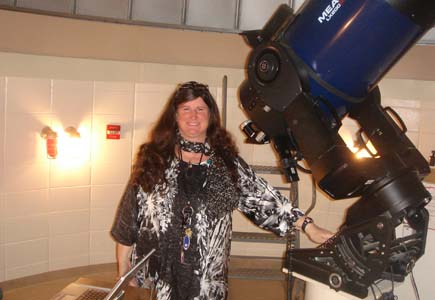
Dee McLellan
Teacher/Observatory Coordinator - Minn.
I grew up in Minneapolis, Minn. I now live in Andover, Minn. and work in Champlin, Minn. I went to school for a teaching degree at the University of Minnesota.
When I was in elementary school, NASA was into the Gemini program and developing the Apollo program. I remember reading in my Weekly Reader about the Apollo 1 accident. I felt sad for the astronauts, but did not understand at the time that it was almost the end of America's manned Moon missions. I remember watching the first man step on the Moon, live on TV. I figured by the time I was 20 years old or so, travel to the moon would be open to the public. As a child, I would tell everyone that I planned to get married on the moon.
As a teacher, I looked for ways to teach science by having my students work with researchers. I used the curriculum from the JASON Project founded by Dr. Robert Ballard, discoverer of the wreck of the Titanic. Several JASON teachers were selected to speak with the principal investigator of the Stardust program, Dr. Don Brownlee. I then found out that the Jet Propulsion Laboratory (JPL) was looking for Stardust Educators, so I applied. After being accepted, the program was broadened to include other NASA missions and I became a solar system educator. Just in the past few years I have been writing curriculum for teachers to use with comet missions, as well as showing teachers how to use this curriculum with their students.
My fifth grade teacher was my inspiration. As we worked on our spelling or math lessons my teacher would push a tall cart into our room with a big boxy black and white TV perched on top, which was tuned to the Apollo rocket launches that were going to the moon! I was so grateful to have a teacher who wanted us to see these live events. That was the year I decided that I wanted to help others learn too. What I really wanted to be was the kind of teacher who helps kids experience and witness science as my fifth grade teacher did for me!
I have witnessed Space Shuttle and other launches from the Kennedy Space Center in Florida. But none of those get me as fired up as my job: coordinating the astronomical observatory at Jackson Middle School in Champlin. As coordinator of the observatory -- a rarity in a middle school -- I am in charge of a rotating domed structure and the 14-inch reflecting Meade Schmidt-Cassegrain telescope within, as well as its classroom. I also direct programs at the observatory, which include not only instruction for Jackson Middle School kids, but instruction and viewing for community groups as well. The most exciting thing for me is when an observatory experience lights a fire in one of the students. My thrill is when I see these students realizing their potential through observations or an experience with a NASA mission. To me, that's my rocket launch.
In order to be a hands-on, exciting teacher I try to be involved with science myself. This has led me to exciting dinosaur digs, flying over active volcanoes, walking on fresh lava and through lava tube caves, and even snorkeling with a giant sea turtle! I have been to mountain tops to witness the rings of Saturn through giant telescopes, and donned a white clean room suit to hold a moon rock and a meteorite.
I watched scientists remove the first sample of comet dust from the Stardust sample return capsule. I watched in awe as a test rover spun around the testing area, and I was there at the base of the Deep Space Network antenna as data came in from the Stardust spacecraft 250 million miles away. I've been to the base of the NASA rocket launch pads and stood on top of the rocket engine test towers. I even watched an astronaut teacher launch into space on the Space Shuttle. I have done all of this, and more, just to bring these experiences back to students and make education exciting for them.
In order to be a good teacher be inspired yourself. Be a student and involved in learning right along with those whom you are teaching. I have not left my students behind. My students have traveled with me to NASA facilities and fossil dig sites. We've watched the northern lights, meteor showers, transits, launches and landings. And the best part about my job is that I get to keep learning and be inspired with my students.
Planetary science is a global profession.

